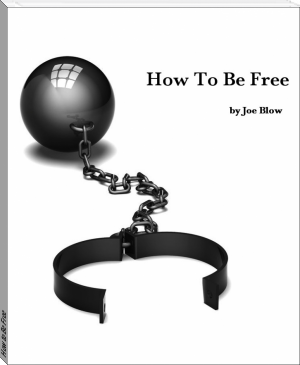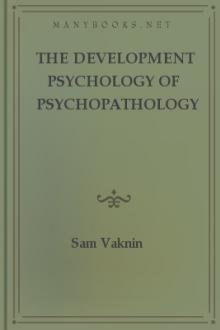How to Be Free, Joe Blow [reading tree .txt] 📗

- Author: Joe Blow
Book online «How to Be Free, Joe Blow [reading tree .txt] 📗». Author Joe Blow
And this is what I mean when I talk about our tendency to project the disowned part of ourselves onto the world around us and then fight against it. The reason that the one thing in the world I couldn’t stand was dishonesty was because my own dishonesty was the thing I was trying to disown. At the height of my neurosis I was going around being an idealistic do-gooder, working for an environmental organisation, but deep down I was just a pit of seething repressed hostility. My colleagues were praising me for my selflessness and generosity while my OCD was asking me whether they would still think so highly of me of I raped and killed their teenage daughter.
This is the nature of Obsessive Compulsive Disorder. Everyone I’ve come in contact with who has it is scrupulously considerate of others, polite and concerned about always doing the right thing. But at the same time plagued by thoughts about doing things like killing babies or putting puppies in the microwave.
How I’ve come out of that situation is through finding insight into myself and others, which I’m presenting in this book, and learning to express any repressed hostility through sick humour rather than keeping it bottled up. I think that the only reason that these hostile feelings build up for those of us who don’t allow ourselves an outlet is because of an unhelpful framework of thinking about ourselves and the world. Once we have a framework which works, we feel little frustration and thus little hostility.
Sexuality
In discussing the nature of sexuality it is necessary to simplify things to a degree. There are qualities that we can reasonably associate with one gender or the other based on probability. The fact that Margaret Thatcher manifests a patriarchal mindset does not alter the fact that patriarchy is an expression of the masculine. Similarly it is helpful to speak about homosexuality without getting into the finer technicalities of Kinsey’s sliding scale of sexual orientation. Homosexuality, like the masculine and the feminine, is something which exists in degrees of purity, but I think the fluidity inherent in the thesis I put forward here is consistent with that variability.
But first we need to examine what we mean by sex. We can forget about the role of sex for reproduction. There is nothing new that I can say about that. The mystery that needs to be explored is that of recreational sex. Why is it important to us? What do we get out of it? Why are the sexual desires of many, if not most, of us gender specific? And what determines to which gender we feel most attracted?
The non-reproductive sexual behaviour of humans exists along a sliding scale. At one end is what we can truly describe as the act of making love. At the other end is rape.
The act of making love is a physical union between equals characterised by the sharing of physical pleasure and in which all party’s are paying full attention to the other participants. This definition allows for the possibility for an act of genuine lovemaking to include more than two participants, but I do feel that such an act is hard to achieve because it is hard to truly focus one’s physical affections on more than one person at a time. Love divided is love diluted.
Next on the scale would be sexual acts in which one or both parties are not really concerned about the pleasure their partner is receiving as long as they are getting what they want or where one or both partners are thinking about someone other than the person with whom they are having sex. Love is still present here as long as one person is giving pleasure to another, but it is one way. It is important to emphasise that there is nothing wrong with this if the nature of the transaction is understood by both parties. Love is a healing force and the more we are unwell the more we need love. To gratefully accept the physical love of another person when we feel unable to fully return it is no different to accepting the care of doctors and nurses when we are in hospital.
Then there are sexual acts engaged in for financial reasons. The need for something that at least feels like love is here on the part of the purchaser, and a degree of genuine affection is by no means uncommon on the part of the provider, but this is clearly not on the same level as an act in which physical love is being freely given.
Then there are various kinds of sexual relationship which are coercive or exploitative. Mutually exploitative relationships needn’t be destructive, for instance a prospective starlet having sex with a producer in return for a job is often an equal exchange in the same way that any form of prostitution can be an equal exchange. But if the situation is not one of equality it becomes true exploitation and is a destructive act. Accepting a blow job from a crack addict in return for some small change is an act devoid of love.
Love is a process of opening up, reaching out and seeking union. It is the opposite of repression or control. We long for wholeness within ourselves and we pursue that wholeness by embracing in the outside world that which corresponds to our suppressed self. Most of us men need to reconnect with the feminine part of ourselves that we have had to repress. So we seek loving union with women. But if we are too extremely neurotic to be able to open up to love, but rather fear the threat it poses to our ego’s fixed state, we may repress our loving instincts further by turning the act of love into an act of violence and attacking the individual who might otherwise be seen as a love object by raping them.
But, if we began our lives by being bisexual as Freud asserts, how do we come to be fixated principally on one or the other gender? And what determines which gender it is?
First we have to return to the story of our origins.
We left off with the establishment of monogamy and sexual repression generally. From here the split between men and woman continued. The angrier and more insecure the men became the more they felt threatened by the women who represented their disowned selves. And the more insensitive the men’s behaviour the more the women would criticise them and so on.
For a long time society remained matriarchal with the nurturers ultimately calling the shots. But as the men became more and more embattled and had to repress their original nature further and further down into their unconscious, they became more and more angry towards that nature and anything that might represent it in the outside world. This was the beginnings of misogyny. Men’s anger at women, arising from their resentment that women could still live at peace with their instincts and be relatively happy while they themselves were in an embattled state of self-doubt, threatened to tear society apart. The only answer was a compromise. Men would not destroy women, but they demanded the right to enchain and control women in the same way that they had to enchain and control their original nature. As long as what was outside mirrored what was inside, psychological stability and thus the stability of society was possible. And a stable society was needed if we were to find understanding. The price that was paid, however, was enormous. Women, the nurturers of the children, were spiritually crippled by their enslavement and became nearly as unhappy and neurotic as the men.
This is the furnace within which our sexuality is forged. Our sexual desire is a pull toward wholeness. The man wants to experience loving acceptance from the original source of criticism of his newly aggressive and competitive behaviour. The woman wants man to come back to her. In her heart of hearts she is still sitting around that campfire looking in heartbreaking sadness at the man who has lost his soul fighting leopards. She wants to love away the pain.
Our sexual love object is a symbol for that with which we want to reunite inside ourselves. Men often are attracted to young pretty women. The features we identify as pretty are childlike features - slim build, wide eyes, full lips and smooth skin. Men’s predilection for such women is so great that, over the process of a couple of a million years, it has led to us becoming more childlike in appearance as a species. We have lost most of our body hair as well as our sloping foreheads. The adult human looks remarkably like a chimpanzee foetus. The reason for this preference is that we associate youth with lack of neurosis, with innocence if you like, with a generosity of spirit, a uninhibited capacity for love. Of course what ignites our sexual arousal is here a symbol and may not reflect the psychological reality of the individual. There is also the MILF (mother I’d like to fuck) archetype. Here once again there is a desire to reunited with the instinct for love but now in the form of the nurturing mother.
One complaint that many men make is that women aren’t attracted to nice guys. Of course this isn’t true. Women’s taste in sexual partners varies greatly. But the complaint arises because of the mystery that many women love men who are not good to them. And in the extreme we see the case of women falling in love with jailed serial killers. But this makes sense if we remember that the origins of modern sexuality are to be found in women’s use of their sexuality as a way of soothing the aggression of men and thus re-socialising them. While the pleasurable sensations of sex can be reason enough to seek it out, it can also be an expression of our deeper selves, and since our deepest nature is one of unconditional love, the desire to use sex as a healing force is very strong in us.
Now we come to the mystery of homosexuality. Bisexuality was our original orientation. A focus of attraction on the opposite sex is explained above. But why do some of us move from bisexuality to an exclusive attraction to the same sex?
I believe the key here is patriarchy - the male-oriented society. Sexual love is driven by a desire to be welcomed back into that from which we feel we have been excluded or to welcome another back. For most of us this desired return is a return to the primal state. But a patriarchal social order has the potential to form another split within males. We can be doubly excluded. First we were excluded from the loving tribal family, now we can be excluded from the patriarchal brotherhood. Now I’m not suggesting that anyone who is not a man’s man becomes a homosexual, far from it. In tribal societies some men did not pass the initiation ceremonies and remained living with the women, but they were not necessarily homosexual. What I’m suggesting is that the underlying reason for a man’s fixation on sex with another man, as opposed to a propensity to be sexually attracted to either sex, is a deep unmet desire to be accepted into the brotherhood of men.
On the surface this





Comments (0)